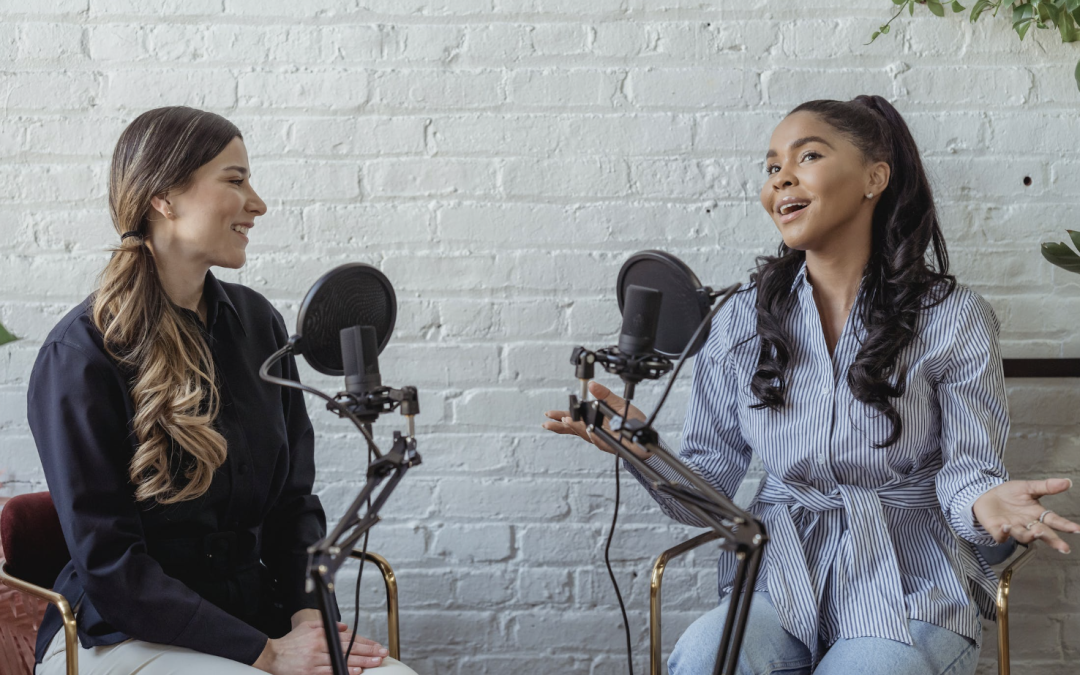When it comes to creating your own podcast, you want to create something that reflects you and what you’ve got to say, and appeals to your audience. When it comes to deciding the format of your podcast, this can be something that will bring your content alive, and can really enhance the ideas that you’ve had.
There are so many formats to choose from, so we’ve put together a blog to look at them, what they are, and what might suit you best.
Too many cooks? How many is too many people in a podcast format?
When it comes to thinking about who to have on your podcast you are going to want to think about a few things. Are you looking to have one person who presents the whole podcast, or a host and guests, a roundtable discussion, or an ever-changing rosta of featured speakers?
Going it alone – are two heads better than one?
Being the sole voice of your podcast may sound daunting, but it is a great way to get started. You don’t need to worry about guests, you know your content best and you can script things quite easily if it is a subject that you speak about often. You could use this format to answer FAQs about your business, put our regular updates on industry trends, or give advice in bitesize chunks.
A good example of this is the recently launched podcast by Lalalaletmeexplain. She does an episode 3 times a week, each around 20 minutes, which is mainly just her speaking and she has a guest on the show every other Friday. This means most of her episodes are her speaking. She does different types of podcast on different days – deep dive, segments where she gives advice etc. – so you know what to tune in for.
Making sure you have two to tango
You could look at a format where you have a host for the podcast who is the same throughout the series, and then a guest on each episode to have a discussion with. This is a tried and tested format for podcasts and a great way to get started.
We work on some great corporate podcasts where the host is someone senior in the business and the guests are key clients who have a great story to tell. It’s such a good way to position yourself within your industry as an expert and showcase the work that you do.
The great thing about having guests on your podcast is you get to tap into other people’s networks when it comes to promotion. Asking someone who has featured to share their episode with their network and tagging them on social media is a good way to ensure that your podcast is finding a new audience.
Making it a group effort
Whilst having more people on your podcast might seem like a chore, it might be that your subject matter is best discussed by a group. This can make for an engaging podcast, a roundtable discussion, panel or fireside chat format.
It can be difficult to keep something like this consistent if there is always a different group of people talking, you might want to think about what would be consistent in each episode. But you could also have an MC, or facilitator, who brings together what everyone says, and ensures that the discussion is going in the right direction.
Another option here, given that with more people there will always be more time needed for everyone to give their thoughts and ideas, is that the consistent element is the group. You could record a longer discussion with a large group, but then edit it into multiple episodes around certain topics that are touched on during the discussion. Here you could look at a good intro / outro for each episode and some commentary around why you’ve used this section of the discussion, which can also bring another fresh perspective in the edit.
Length of podcast – what is best?
Thinking about the length of your podcast, what is ideal? I think the answer here lies very much in what you are trying to achieve.
I was talking to a client recently about their podcast, and we were coming up with ideas of how to make it a bit different. At one point in the discussion I just threw in another idea, why not just keep it simple?
Most podcasts clock in at around 30 minutes, and it’s a good length. It gives you time to introduce your topic, ask questions and explore it, take maybe one good tangent and wrap things up before your listeners have a chance to think about doing something else.
What I suggested to the client was this, let’s not make the length of the podcast the thing that makes it different. They have a good host and guests lined up, let them do their thing and work their magic. We talked instead about putting in some short segments to the podcast – rapid fire questions, FAQs etc – that each guest in the series would tackle, which would break up the episode and help to make it stand out a bit. The length would remain at around 30 minutes but they’d still get something that reflects the difference their content can bring.
Again, there are no hard and fast rules. If you are looking to give a lot of information in a podcast you could break it up into 10-minute ‘minisodes’ giving your audience a chance to pick and choose what they want to listen to, and what subjects they find most interesting.
Don’t fear a longer podcast, if you have a great idea and it includes a reason for the podcast to be longer, then go with it. As long as there is good editing that ensures the length isn’t repetition or multiple tangents or other elements that might make the listeners feel a bit less engaged over time, then there’s nothing to say you can’t. You might even want to acknowledge that your podcast goes long, break it into chunks with a short ‘break’ to briefly chat on a different subject and give your listeners a heads up that this is a good time to pause if they are listening over a few sessions.
Whatever format you are looking at for your podcast, just go back to what you want to say, and who you want to say it to. Your audience, your message, those are going to shape the format of your podcast when it comes to the length and the guests you choose to have on.
If you are looking for professional podcast production, then do get in touch. We’ve made podcasts for finance companies, top brands, actors, musicians and more and we’d love to chat about how we can bring one to life for you.
This blog was written by Laura Winton, our podcast production manager.

